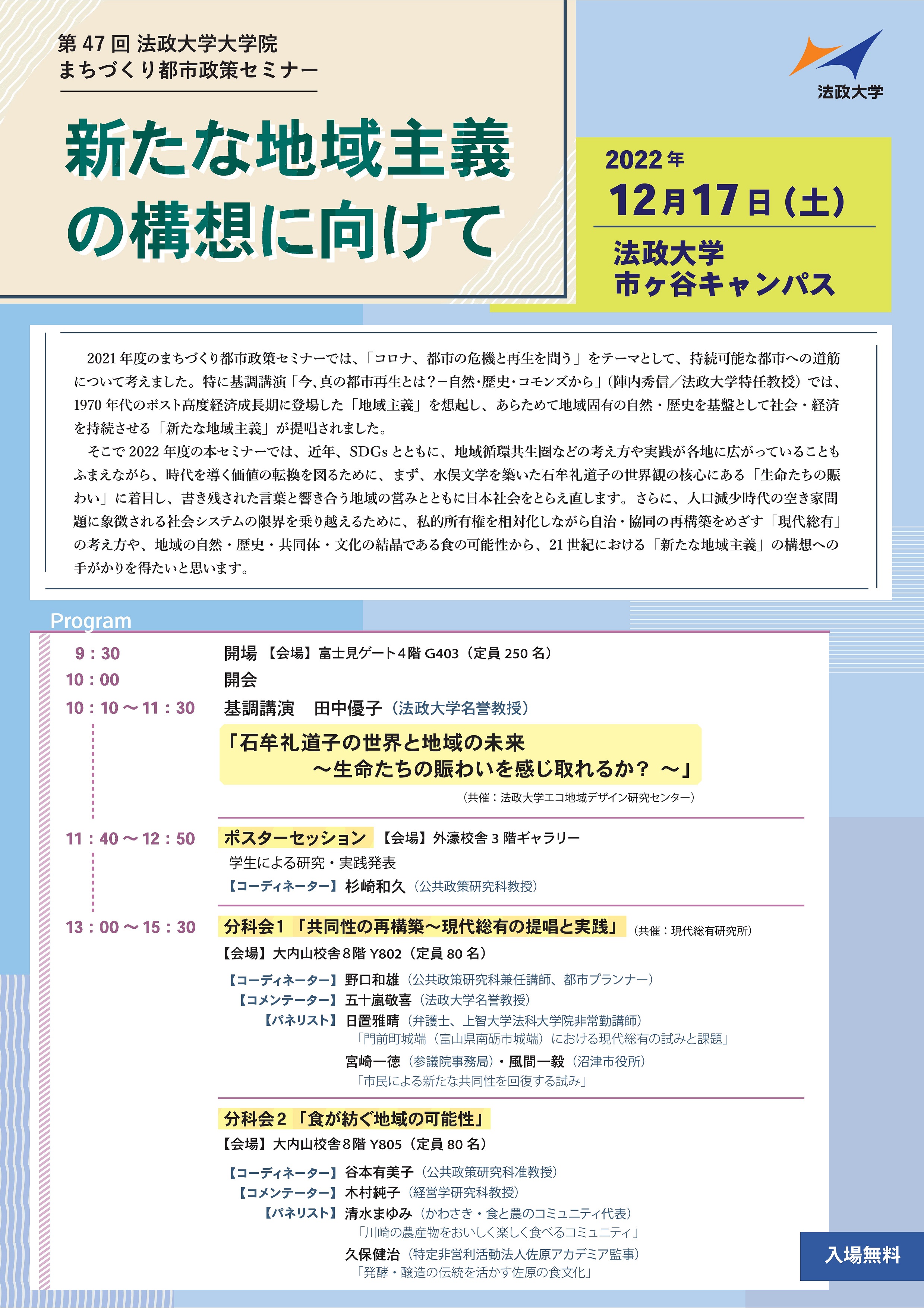Notices
The 47th Hosei University Graduate School Seminar on Urban Planning and Urban Policy (12/17)
- March 27, 2023
- Events and Occasions
The 47th Hosei University Graduate School Seminar on Urban Planning and Urban Policy was held
On December 17, 2022, the 47th Hosei University Graduate School Seminar on Urban Planning and Urban Policy was held at the Ichigaya Campus, following the previous year's seminar. Unfortunately, it was a rainy and cold day, but many people attended the keynote lecture in the morning, and as the organizer, we sincerely appreciate their participation.
The 47th meeting was a continuation of the previous year's keynote speech by Professor Hidenobu Jinnai of Hosei University, "What is True Urban Regeneration Now? -from the perspective of nature, history, and the commons"), to explore the term "new regionalism" proposed in the previous year's keynote speech, "Toward a New Regionalism Concept" was the common theme, followed by a keynote speech by Professor Emeritus Yuko Tanaka, former President of Hosei University, and then two from the approaches of contemporary total ownership and food The two subcommittees discussed the theme from the approaches of contemporary total ownership and food.
Below is an introduction to the keynote speech, the two breakout sessions, and the poster session in which graduate and undergraduate students described their research and local practices. We also provide the transcript of the keynote speech, which we hope will be of interest to those who were not able to attend the event.
The 47th Hosei University Graduate School Seminar on Urban Planning and Urban Policy Steering Committee

Keynote Speech Keynote Speech "The World of Michiko Ishimure and the Future of Local Communities: Can You Feel the Lively Life of People? -" (Yuko Tanaka, Professor Emeritus, Hosei University)
The keynote lecture, using Michiko Ishimure's Minamata literature as a text, provided an opportunity to consider "the liveliness of life," which can be considered a fundamental value of "new regionalism.
In the first half of the lecture, focusing on "Tsubaki no Umi no Ki" (Chronicle of the Sea of Camellia), which describes Michiko Ishimure's original landscape, the lecturer explained how Michiko's view of community as "a world where all things breathe together" led to her subsequent sympathy, mutual suffering, and struggle with Minamata disease patients, and to "Spring Castle" which overlapped with the Amakusa Rebellion.
In the latter half of the lecture, he expanded on Shozo Tanaka's words, "A true civilization should not destroy mountains, rivers, villages, or kill people," as well as on Tani Junior High School, referring to Sado Island and the Shirakami Mountains, which Tanaka himself visited during his seminar camp. He also mentioned that it is important to know the existence of people who have been living in the region in order to seek the ideal form of the region and its revival, which is different from the modernization of the past.
■ Poster Session Poster Session
After the keynote speech, the event was held during the lunch break in the 3rd floor gallery of the Sotobori Building.
Eight posters by both undergraduate and graduate students were displayed on panels in the hall, and presentations were given first in the order of the panels. The nearly 40 participants gathered at the venue moved in front of the posters to listen to the presentations. After the presentations were finished, the presenters waited in front of each poster to exchange ideas with those who were interested. This year's presentations, by both undergraduate and graduate students, were mainly the results of seminar activities and fieldwork for exercises.
■ "The Future of the Community" (Yuko Tanaka, Professor Emerita, Hosei University) Subcommittee 1 "Reconstruction of Community: Advocacy and Practice of Contemporary Souyoku" ■ Subcommittee 2 "Reconstruction of Community: Advocacy and Practice of Contemporary Souyoku
In this subcommittee, we discussed the possibilities and prospects of "reconstruction of community" by introducing several efforts of Gendai Soyo to address the issue of land and space being neglected and abandoned in Japan, where private ownership of land and space is strong due to the country's entry into a population-neutral society. First, Mr. Masaharu Hioki reported online on Gendai Soyu's attempts and challenges in the gate town of Johata (Johata, Nanto City, Toyama Prefecture). Kazunori Miyazaki and Kazutake Kazama also introduced the reconstruction of community centered on books in various locations. Commentator Keiki Igarashi, who is also the nominator of "Gendai Soyuu," discussed the possibility of "civic projects" to rebuild community between people and space from the perspective of "Gendai Soyuu" as an effort to build a new community that is distinct from the "commons," an old type of communal effort such as membership. The discussion focused on the possibility of "civic projects" to reconstruct the community of people and space.
■ Section Meeting 2 ■ Section Meeting 2 "The Potential of the Community Spun by Food" (Yuko Tanaka, Professor Emeritus, Hosei University)
In this subcommittee, Ms. Mayumi Shimizu reported on the expansion of food culture through a project to convey and deliver the traditional Kawasaki vegetable "norabo-gai" and the exchange with children through the "Kawasaki C-Grade Gourmet Contest" using Kawasaki agricultural products. Kenji Kubo reported on his recent efforts to develop food products and "fermentation tourism" by combining the tradition and innovation of fermentation culture that has supported the development of Sawara since the Edo period. Commentator Junko Kimura suggested that these efforts and the "Territorio Strategy" in Italy share the same keywords for a "prosperous society," and a glocal discussion ensued on the possibilities of the region.
Contact Us
Graduate School Division, Hosei University
TEL: 03-5228-0551
E-mail: i.hgs[at]ml.hosei.ac.jp
Please replace [at] with "@".

